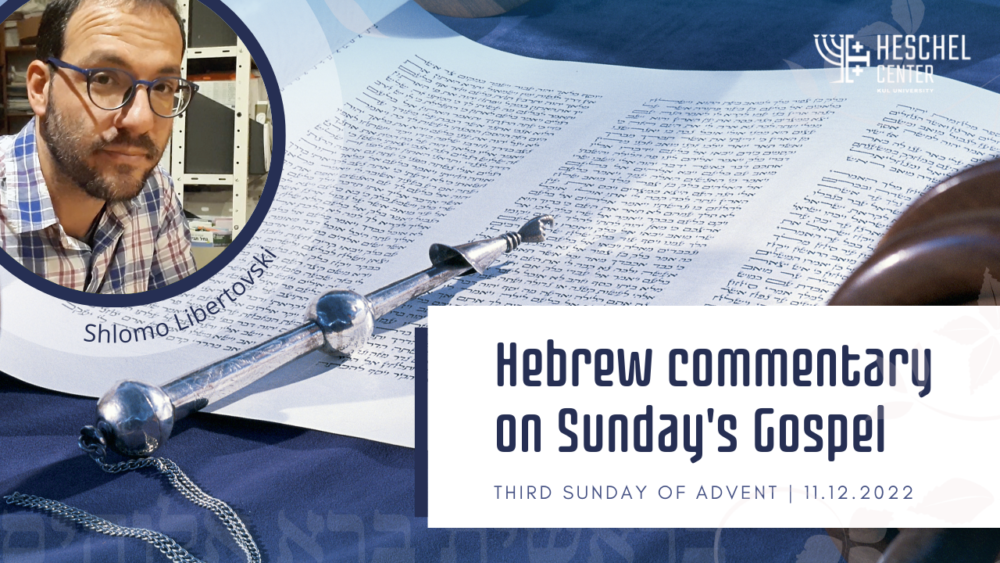Hebrew commentary on the Gospel for the Third Sunday of Advent

Photo: KUL Heschel Center
The announcement of the Messiah, who comes and heals His people and is willing to suffer for them. Jesus used this and other concepts because he knew that his listeners were well familiar with them and he wanted them to read the events of his time in this light – writes Shlomo Libertowski, lecturer in Torah at Beth Shemesh, in his commentary for the Heschel Center of the Catholic University of Lublin. The commentary provides a deeper understanding of Gospel for the Third Sunday of Advent (Mt 11:2-11)
In Judaism there is this idea that one of the characteristics of the Messiah is his ability to heal people. This corresponds to the idea conveyed in Isiah 35:
Strengthen the hands that are feeble,
make firm the knees that are weak,
say to those whose hearts are frightened:
Be strong, fear not!
Here is your God,
he comes with vindication;
with divine recompense
he comes to save you.
Every morning religious Jews praise God for His ability to heal the sick people. There is a whole list of ailments and it is quite similar to the one given by Jesus in this Gospel:
Blessed are You, Lord our God, King of the Universe, Who gives sight to the blind.
Blessed are You, Lord our God, King of the Universe, Who clothes the naked.
Blessed are You, Lord our God, King of the Universe, Who releases the imprisoned.
Blessed are You, Lord our God, King of the Universe, Who straightens the bent.
The tradition of this prayer goes back to the time of the Second Temple. One of the traits of the Messiah is his ability to heal the sick and to bring comfort to the weak. This prayer makes us think of God’s immense power to restore life but also draws our attention to the Messiah himself.
In Judaism there is a belief that the Messiah will suffer for the human race. We see this thought present in the Talmud (Sanhedrin 98b) and it is interesting to read it against the background of this Gospel as comforting others and suffering for them are intertwined:
Apropos the Messiah, the Gemara asks: What is his name? The school of Rabbi Sheila says: Shiloh is his name, as it is stated: “Until when Shiloh shall come” (Genesis 49:10). The school of Rabbi Yannai says: Yinnon is his name, as it is stated: “May his name endure forever; may his name continue [yinnon] as long as the sun; and may men bless themselves by him” (Psalms 72:17). The school of Rabbi Ḥanina says: Ḥanina is his name, as it is stated: “For I will show you no favor [ḥanina]” (Jeremiah 16:13). And some say that Menaḥem ben Ḥizkiyya is his name, as it is stated: “Because the comforter [menaḥem] that should relieve my soul is far from me” (Lamentations 1:16). And the Rabbis say: The leper of the house of Rabbi Yehuda HaNasi is his name, as it is stated: “Indeed our illnesses he did bear and our pains he endured; yet we did esteem him injured, stricken by God, and afflicted” (Isaiah 53:4).
Midrash Yalkut Shimoni, even though written in a more modern times, further helps us to understand the ancient awaiting for and the person of the Messiah in Judaism in its commentary on Psalms/Tehilim 620-621,:
“The iniquities of those who are hidden with you will ultimately bring you into an iron yoke, and they will do to you like this calf, darkening its eyes; they will choke your breath with the yoke and with their iniquities. Your tongue will ultimately cling to the roof of your mouth. Are you willing on these terms?”
Messiah said before the Holy One, blessed is he, “Master of the universe, will this suffering last for many years?”
The Holy One, blessed is He, said to him, “By your life and the life of your head, I have decreed a week upon you; if your soul is in pain, I will expel the suffering at this time.”
He said to him, “Master of the universe, with a joyful and glad heart, I will accept upon myself on condition that not one of Israel will perish.”
The idea of Elijah being sent before the coming of the Messiah is present in Judaism. He is to bring the good news and also to reconcile the differences between the generations. He is supposed to prepare people’s hearts for the special news of redemption:
Behold, I am sending my messenger ahead of you;
he will prepare your way before you. (Malachi 3,1)
Jesus uses this and other concepts because he knew that his listeners were well familiar with them and he wanted them to read the events of his time in this light.
About the author
Shlomo Libertovski, a Torah lecturer at Beth Shemesh and a member of Nostra Aetate 4 in Jerusalem, an ecumenical organization dedicated to Jewish-Catholic dialogue.


